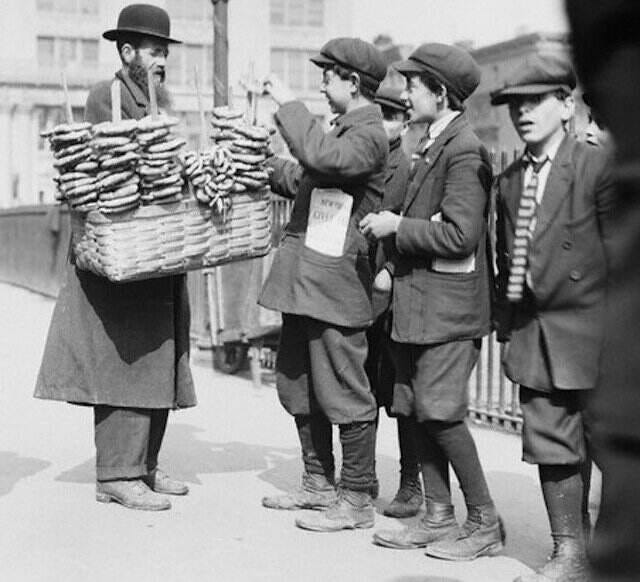Notable Sandwiches #4: All Hole, No Bagel
"I prefer my bagels, like my spirit, tough, and hand-rolled. Not smushed into toast, not scooped-out for reduced carbs, not, G-d forbid, pillowy and biteless in a supermarket plastic sleeve."
Welcome to the fourth installment of Notable Sandwiches, a project where I chronicle Wikipedia’s List of Notable Sandwiches through essay, story, recipe, and miscellany, in alphabetical order. Today we’re up to #4: Bagel Toast.
I love projects, especially ones with arbitrary and designated guidelines that have not been set by me. I learned to exercise through the bright, chipper tones of the automated voice coach on the 5k Runner app: the shape of it was laid out for me so clearly. This is far more applicable, however, in writing. It’s one of the paradoxes of writing that sometimes a limiting and precise form can engender great freedom: think of the absurd and punishing structure of a villanelle (five tercets followed by a quatrain, with two repeating rhymes and two refrains), and then take a look at Sylvia Plath’s Mad Girl’s Love Song, one of my favorite poems:
I shut my eyes and all the world drops dead;
I lift my lids and all is born again.
(I think I made you up inside my head.)The stars go waltzing out in blue and red,
And arbitrary blackness gallops in:
I shut my eyes and all the world drops dead.I dreamed that you bewitched me into bed
And sung me moon-struck, kissed me quite insane.
(I think I made you up inside my head.)God topples from the sky, hell's fires fade:
Exit seraphim and Satan's men:
I shut my eyes and all the world drops dead.I fancied you'd return the way you said,
But I grow old and I forget your name.
(I think I made you up inside my head.)I should have loved a thunderbird instead;
At least when spring comes they roar back again.
I shut my eyes and all the world drops dead.
(I think I made you up inside my head.)
In her gifted hands, the enforced rhythm and structure of the villanelle become a gift, the poem itself a lullaby of madness, whose gentle tempo enfolds a burning core. You could waltz to this poem if you wanted, a dance over hot coals.
I’m not comparing myself to Plath (or, God help me, Shakespeare, or Petrarch, or your favorite sonneteer)—just pointing out that formal restrictions can aid your writing, and that sometimes, choices removed make one more creative. In the case of this series, the List of Sandwiches is a self-imposed boundary. This project will, if I stick with it, take years, guided solely by my choice of untrammeled obedience to these little boxes on a landing page. I’ve chosen to treat a freewheeling, democratic, and perennially changeable text as an inviolable source, as if it was written in stone and not pixels by its legion of anonymous authors.
But I have to say it: they were wrong to omit bagels.
It’s nuts to me that this list includes Bagel Toast—an Israeli spin on the eponymous bread item, which has softer dough and is essentially a glorified, circular cheese-and-veg panini—and omit the bagel itself. I mean: a bagel with cream cheese! Bagels with lox! The entire aquarium of smoked fishes that sit so well beneath the noble and sturdy crown of the bagel! My body rebels.
To be wildly melodramatic, and not a little digressive: Skipping the Yiddish bagel and going straight to the Hebrew bagel toast reminds me of the ways in which early Zionists sought to erase all of exilic Jewish history, condemning it as the suffering of a race of cowards. These ideologues elided millenia in their quest to build a new, smooth, muscled land-conquerer of a Jew. So much richness was and is continually erased in this tautological view of Jewish history: the mound of smoked trout or whitefish or sable kept in the warm firm embrace of the bagel; the loves and lives and exegesis and utopian radicalism of the Jews of Europe. A bagel toast is a delicious thing—it’s got olives—but it is not a pinnacle to be upheld, not the end of Jewish history. You can’t skip the bagel of Ostropol, the bagel of Odessa, the bagel of Vilnius and pretend you’re landing square in the Mediterranean sun without the burdens of your past. You can flatten and sear what you brought with you, uphold an ideology of blood and strength. But by doing so you have lost so much you don’t even remember what you’ve lost in the process.
The Sword and the Sandwich is a newsletter about serious extremism and equally serious sandwiches. Please consider supporting this work with a paid subscription:
Sometimes the best choice when it comes to formal writing restrictions is to subvert them. To keep them in name, but abandon them entirely in practice. They can serve as a point of inspiration, even of guidance and restraint. Departing from established forms while acknowledging their influence can be powerful in its own right. Consider another one of my favorite poems, “The Shrinking Lonesome Sestina” by Miller Williams, which departs radically from the norms of the sestina (a “complex thirty-nine-line poem featuring the intricate repetition of end-words in six stanzas and an envoi,” invented by a 12th-century troubadour named Arnaut Daniel). Williams retains the ideas of repetition (“home; come; fast; time”); the poem is even thirty-nine lines long. But the syllabic restriction gives way to something more pliant, more tender, evocative of the way yearning trails off in the heart:
Somewhere in everyone’s head something points toward home,
a dashboard’s floating compass, turning all the time
to keep from turning. It doesn’t matter how we come
to be wherever we are, someplace where nothing goes
the way it went once, where nothing holds fast
to where it belongs, or what you’ve risen or fallen to.What the bubble always points to,
whether we notice it or not, is home.
It may be true that if you move fast
everything fades away, that given time
and noise enough, every memory goes
into the blackness, and if new ones come—small, mole-like memories that come
to live in the furry dark–they, too,
curl up and die. But Carol goes
to high school now. John works at home
what days he can to spend some time
with Sue and the kids. He drives too fast.Ellen won’t eat her breakfast.
Your sister was going to come
but didn’t have the time.
Some mornings at one or two
or three I want you home
a lot, but then it goes.It all goes.
Hold on fast
to thoughts of home
when they come.
They’re going to
less with time.Time
goes
too
fast.
Come
home.Forgive me that. One time it wasn’t fast.
A myth goes that when the years come
then you will, too. Me, I’ll still be home.
So much about Jewish history is so remarkably old. It makes the sestina look young, our rough and ancient words, our languages, our texts, from which entire separate world religions sprang. The bagel itself—whose etymology is obscure, but is often attributed to the Yiddish word “beigen,” to bend, for the way the pliant wet dough is shaped around the paddle before it’s lowered into the scalding water—is at least four hundred years old. The first written record of a bagel is from 1610, in Krakow. Its journeys mirror our own—across countries and time, through the dulling anomie of assimilation, which leaves bagels soft and indistinct from any other bread. It’s not the most vaunted object; it’s humble. It doesn’t always agree with Gentile critics—one particularly vicious New York Times writer in 1960 called the bagel an “unsweetened doughnut with rigor mortis.” But a good bagel rewards patience: all it asks for is a little work of the jaw, a little time, a little salt.

The current wave of fashionable “New York” bagel purveyors, as attested to by the Times, is a kitschified version of prior generations of Jewish appetizing stores, delis and bakeries—inspired, in part, by the vacuous and sterile Amazon Prime show “The Marvelous Mrs. Maisel,” whose lead actress is of Irish-Catholic descent. The Times is obligated towards restraint and objectivity in its pages, but I, the tyrant of this weird kingdom, have no such requirements. These places and that show make my skin crawl a little; it’s all aesthetic and no soul, all hole and no bagel. I’m not so much a snob as a jaded crank who prefers my bagels, like my spirit, tough and hand-rolled. Not smushed into toast, not scooped-out for reduced carbs, not, G-d forbid, pillowy and pliant in a supermarket plastic sleeve. They have to have a bite to them, like the radical Jewish bakers of Los Angeles in the 1930s did, when they fought for union rights, fed the community for free during the Depression, and were raided so violently by the police that one of them died at an officer’s hands.
Bagels are born of exile. Of intermingling. They are circular, like the cycle of suffering and freedom, of ecstasy and pain, exile and return and exile. They are also the subject of one last poem I’ll share with you, by the Jewish poet David Ignatow, born in Brooklyn in 1914 and author of the remarkable Rescue the Dead (1968). It is a humble little text; it has no formal restrictions. Like the bagel, it is, simply, what it is.
Poem 062: The Bagel
I stopped to pick up the bagel
rolling away in the wind,
annoyed with myself
for having dropped it
as if it were a portent.
Faster and faster it rolled,
with me running after it
bent low, gritting my teeth,
and I found myself doubled over
and rolling down the street
head over heels, one complete somersault
after another like a bagel
and strangely happy with myself.







I like to say bagels should taste like the tears of my people.
I am 100% having a bagel tomorrow morning. We brought 6 back from Bergen County and froze them. Tomorrow they will be mine! I'm thinking egg and cheese? Bacon egg and cheese? Bacon egg and cream cheese??